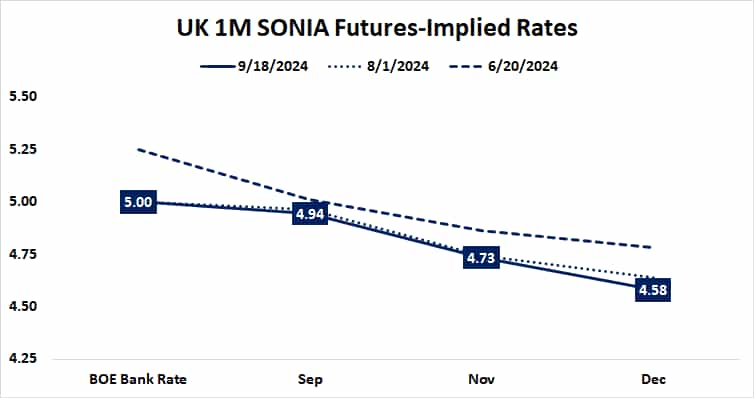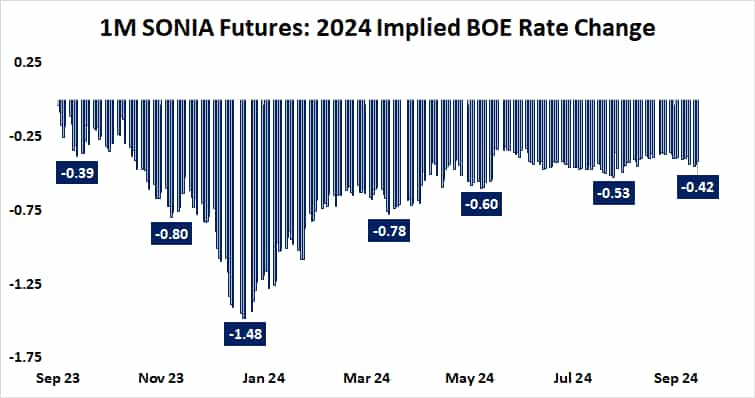After the Fed Fails to Excite the Markets, All Eyes Are Turning to the Bank of England

After the Fed Fails to Excite the Markets, All Eyes Are Turning to the Bank of England
By:Ilya Spivak
The BOE seems to have room to reassure markets an easing remains underway, with this month marking a pause
The Fed failed to excite the markets despite delivering on dovish expectations with a big cut in interest rates.
So, all eyes are now turning to the Bank of England, which is expected to keep rates unchanged.
Comments signaling the rate cut cycle will continue may hurt the British pound.
The Federal Reserve seemingly gave the markets everything they wanted. Officials cut rates by 50 basis points (bps), signaled two more 25bps reductions are on the menu in November and December and laid out plans for a further 100bps in easing for 2025. That’s almost exactly in line with market pricing ahead of the announcement.
Traders offered a circumspect response, as expected. Stocks burst higher and the U.S. dollar slumped in the moments after the Fed’s decision came across the wires, then rapidly reversed course. The bellwether S&P 500 and the tech-tilted Nasdaq 100 are now on pace to finish the day with modest losses, while the greenback aims at a higher close.
After the Fed, interest rate watchers turn to the Bank of England
Attention now pivots across the Atlantic as the Bank of England (BOE) delivers its own policy update. It is expected to hold fire this month after starting its easing cycle with a 25bps rate cut in August. Markets price in 42bps further in 2024, implying standard-sized cuts are likely at the U.K. central bank’s meetings in November and December.

In the run-up to the policy meeting, August consumer price index (CPI) data showed core inflation quickened for the first time since May 2023. It rose to 3.6% year-on-year, narrowly topping forecasts penciling in 3.5%. The British pound rose as the numbers came across the wires, suggesting some pushback on rate cut bets (as expected).
Looking deeper into the data, service sector inflation remained the most worrying bit for BOE officials. While headline CPI has come down from a peak of 11.1% year-on-year to current levels, the services component registered at 5.6% in August. That’s down less than 2 percentage points from the peak at 7.4%.
The British pound may fall even as the BOE holds back a rate cut
Much of the story here seems to be linked to wages, but these have been trending helpfully lower recently. Growth cooled to just 4% year-on-year in July, the slowest since November 2020. More of the same might be likely if the economy continues to stagnate. Gross domestic product (GDP) failed to grow in June and July.

What’s more, a one-off jump in airfares seems to have skewed services inflation higher in August. They rose at the second-fastest pace on record. Still, the BOE probably has coverage to hold fire this time as leading purchasing managers’ index (PMI) data hints at a cautious pickup in the pace of economic activity growth last month.
On balance, this seems to leave a bit of room for BOE officials to reassure the markets that an easing remains underway, with this month marking a pause instead of a loss of confidence in the direction of travel. That could cement conviction in 50bps of further easing this year, pulling the British pound lower.
Ilya Spivak, tastylive head of global macro, has 15 years of experience in trading strategy, and he specializes in identifying thematic moves in currencies, commodities, interest rates and equities. He hosts Macro Money and co-hosts Overtime, Monday-Thursday. @Ilyaspivak
For live daily programming, market news and commentary, visit tastylive or the YouTube channels tastylive (for options traders), and tastyliveTrending for stocks, futures, forex & macro.
Trade with a better broker, open a tastytrade account today. tastylive, Inc. and tastytrade, Inc. are separate but affiliated companies.
Options involve risk and are not suitable for all investors. Please read Characteristics and Risks of Standardized Options before deciding to invest in options.
tastylive content is created, produced, and provided solely by tastylive, Inc. (“tastylive”) and is for informational and educational purposes only. It is not, nor is it intended to be, trading or investment advice or a recommendation that any security, futures contract, digital asset, other product, transaction, or investment strategy is suitable for any person. Trading securities, futures products, and digital assets involve risk and may result in a loss greater than the original amount invested. tastylive, through its content, financial programming or otherwise, does not provide investment or financial advice or make investment recommendations. Investment information provided may not be appropriate for all investors and is provided without respect to individual investor financial sophistication, financial situation, investing time horizon or risk tolerance. tastylive is not in the business of transacting securities trades, nor does it direct client commodity accounts or give commodity trading advice tailored to any particular client’s situation or investment objectives. Supporting documentation for any claims (including claims made on behalf of options programs), comparisons, statistics, or other technical data, if applicable, will be supplied upon request. tastylive is not a licensed financial adviser, registered investment adviser, or a registered broker-dealer. Options, futures, and futures options are not suitable for all investors. Prior to trading securities, options, futures, or futures options, please read the applicable risk disclosures, including, but not limited to, the Characteristics and Risks of Standardized Options Disclosure and the Futures and Exchange-Traded Options Risk Disclosure found on tastytrade.com/disclosures.
tastytrade, Inc. ("tastytrade”) is a registered broker-dealer and member of FINRA, NFA, and SIPC. tastytrade was previously known as tastyworks, Inc. (“tastyworks”). tastytrade offers self-directed brokerage accounts to its customers. tastytrade does not give financial or trading advice, nor does it make investment recommendations. You alone are responsible for making your investment and trading decisions and for evaluating the merits and risks associated with the use of tastytrade’s systems, services or products. tastytrade is a wholly-owned subsidiary of tastylive, Inc.
tastytrade has entered into a Marketing Agreement with tastylive (“Marketing Agent”) whereby tastytrade pays compensation to Marketing Agent to recommend tastytrade’s brokerage services. The existence of this Marketing Agreement should not be deemed as an endorsement or recommendation of Marketing Agent by tastytrade. tastytrade and Marketing Agent are separate entities with their own products and services. tastylive is the parent company of tastytrade.
tastyfx, LLC (“tastyfx”) is a Commodity Futures Trading Commission (“CFTC”) registered Retail Foreign Exchange Dealer (RFED) and Introducing Broker (IB) and Forex Dealer Member (FDM) of the National Futures Association (“NFA”) (NFA ID 0509630). Leveraged trading in foreign currency or off-exchange products on margin carries significant risk and may not be suitable for all investors. We advise you to carefully consider whether trading is appropriate for you based on your personal circumstances as you may lose more than you invest.
tastycrypto is provided solely by tasty Software Solutions, LLC. tasty Software Solutions, LLC is a separate but affiliate company of tastylive, Inc. Neither tastylive nor any of its affiliates are responsible for the products or services provided by tasty Software Solutions, LLC. Cryptocurrency trading is not suitable for all investors due to the number of risks involved. The value of any cryptocurrency, including digital assets pegged to fiat currency, commodities, or any other asset, may go to zero.
© copyright 2013 - 2026 tastylive, Inc. All Rights Reserved. Applicable portions of the Terms of Use on tastylive.com apply. Reproduction, adaptation, distribution, public display, exhibition for profit, or storage in any electronic storage media in whole or in part is prohibited under penalty of law, provided that you may download tastylive’s podcasts as necessary to view for personal use. tastylive was previously known as tastytrade, Inc. tastylive is a trademark/servicemark owned by tastylive, Inc.
Your privacy choices